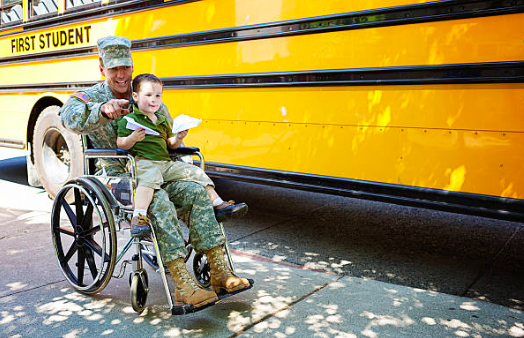

HB 30 would expand the school property tax credit for all veterans considered 100% disabled. (iStock)
A bill that would remove the three-year residency requirement to qualify for the Disabled Veteran Tax credit drew concerns in the House Education Committee Wednesday.
Some members wanted an income limit or means test included in the bill.
After a motion to table the bill failed, House Bill 30 was eventually released to the House floor.
If passed, First State veterans who are 100% disabled would not have to pay their school property tax.
The bill defines disabled veterans as a person who receives 100% disability compensation from the United States Department of Veterans Affairs or its successor agency due to a service-connected, permanent and total disability based on unemployability, or a 100% disability rating.
Rep. Sean Lynn, D-Dover, initially asked if there would be any income limitations on the tax break.
“Receiving VA disability doesn’t preclude veterans from working, so is this designed for veterans whose only source of income are their VA benefits?” Lynn asked Rep. Bill Bush, D-Dover, the bill’s sponsor.
That answer is no, which led to several committee members requesting some sort of means test to see if a disabled veteran actually needs the tax break.
“There’s no limitation,” said Rick Geisenberger, the state’s Finance Secretary. “You can be a 100% disabled veteran and you can have millions of dollars of income.”
Although he didn’t have a vote, Geisenberger said the Department of Finance was against the bill.
How many veterans get a tax break?
He said the current tax break, which requires a three-year residency, is used by 710 disabled veterans.
A simple means test, he said, would be to look at the property values of applicants’ homes, rather than looking at someone’s income, which typically changes much more often than property values.
“The current disabled veterans tax credit program is in its infancy,” Geisenberger said. “With only one year of actual data to analyze, we believe it’s advisable to have more experience in history prior to making additional modifications.”
There’s still four months left to apply to this year’s tax credit, and Geisenberger. The Finance Department expects a 30% increase in applications over that span for a total of 923 disabled veterans who will receive this year’s tax credit.
He pointed out that expanding the number of people who get the tax breaks would lose the state a lot of money.
Expanding the tax credit would cost the state between $248,887 and $518,514 in Fiscal Year 2024, according to the bill’s fiscal note.
The tax credit average is $1,500, with a range from $633 to $4,632.
“That’s for a single year, and that will be savings that they’ll get every single year,” Geisenberger said. “If their spouse outlives them for another 20, 30 years, they’ll continue to get that benefit.”
Rep. Rich Collins, R-Millsboro, voted for the bill and said he’s 1,000% for supporting those who served America.
“But it is a little concerning,” he said. “I mean, a person could literally be a multimillionaire and be a disabled veteran, so there must be some way to define what we’re trying to do with a little more clarity.”
Rep. Eric Morrison, D-Glasgow, agreed with Collins, and joked that this is probably the first time that has ever happened.
He said a means test should be required even for those who have 3-year residencies and for the senior school property tax break.
Morrison, who has 13 years of professional experience working in Medicaid and other health-assistance programs acknowledged having a means test for every tax break could create staffing issues and other challenges.
He voted for the bill, but said he “hopes that we will continue to have conversations about the best way to give relief to people who need it and give the maximum amount to those who need it.”
Lynn also called for a means test for all disabled veterans applying for the tax break, saying the intent of the credit is to help veterans who are not able to work full-time jobs and whose only source of income is their Veteran Affairs benefits.
Rep. Jeff Hilovsky, R-Millsboro, pointed out that less than 1% of America’s population is in the military, and just a small faction of those people are 100% disabled.
His point – there’s a very small amount of Delawareans that this would actually affect.
“I understand the questions in the comments,” he said. “However, I also want people to think of the statistics.”
Rep. Mike Smith, R-Pike Creek, agreed with this sentiment, citing that the tax break is already in place.
“This is already something we have on the books and this would help those very few that aren’t eligible currently.”
Also in the committee’s first meeting of the 152nd General Assembly, HB 34, which would require school boards to hold a public comment period before any action items are voted on, was released to the House floor.
RELATED STORY: 3 property tax bills up for hearing Wednesday
Virtually all districts already do this, but committee chair Rep. Kim Williams, D-Marshallton, said the law would ensure community members have a chance to voice their opinions or concerns before any votes are taken.
Two bills – HB 29 and HB 31 – that were on the docket that would increase the school tax credit for Delaware residents who are 65 and older were not discussed. They’re expected to be revisited.


Raised in Doylestown, Pennsylvania, Jarek earned a B.A. in journalism and a B.A. in political science from Temple University in 2021. After running CNN’s Michael Smerconish’s YouTube channel, Jarek became a reporter for the Bucks County Herald before joining Delaware LIVE News.
Jarek can be reached by email at [email protected] or by phone at (215) 450-9982. Follow him on Twitter @jarekrutz
Share this Post



